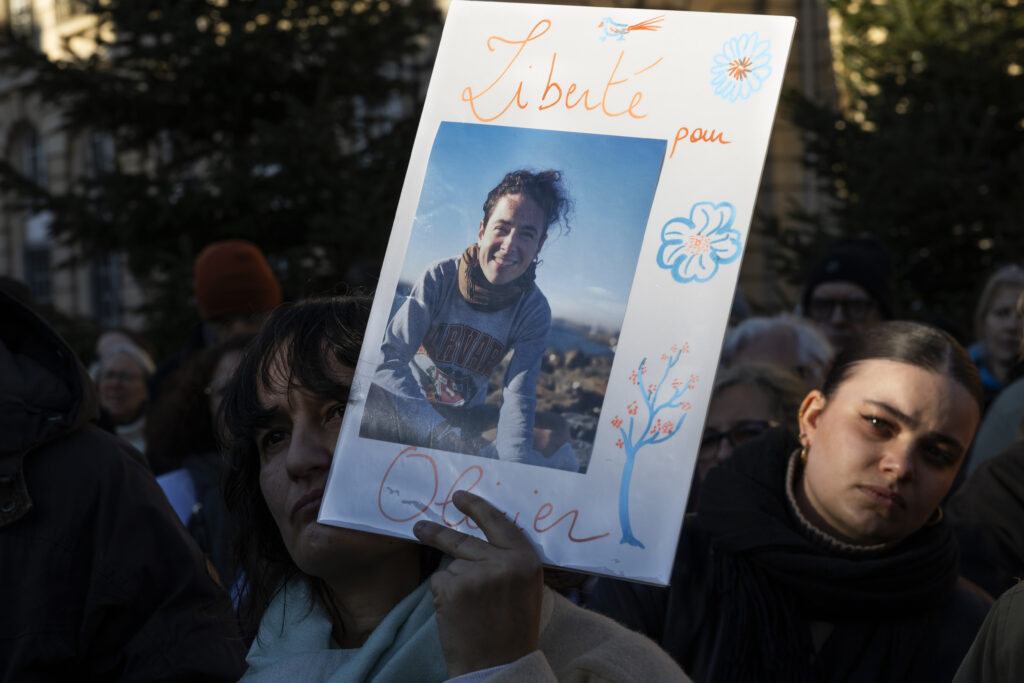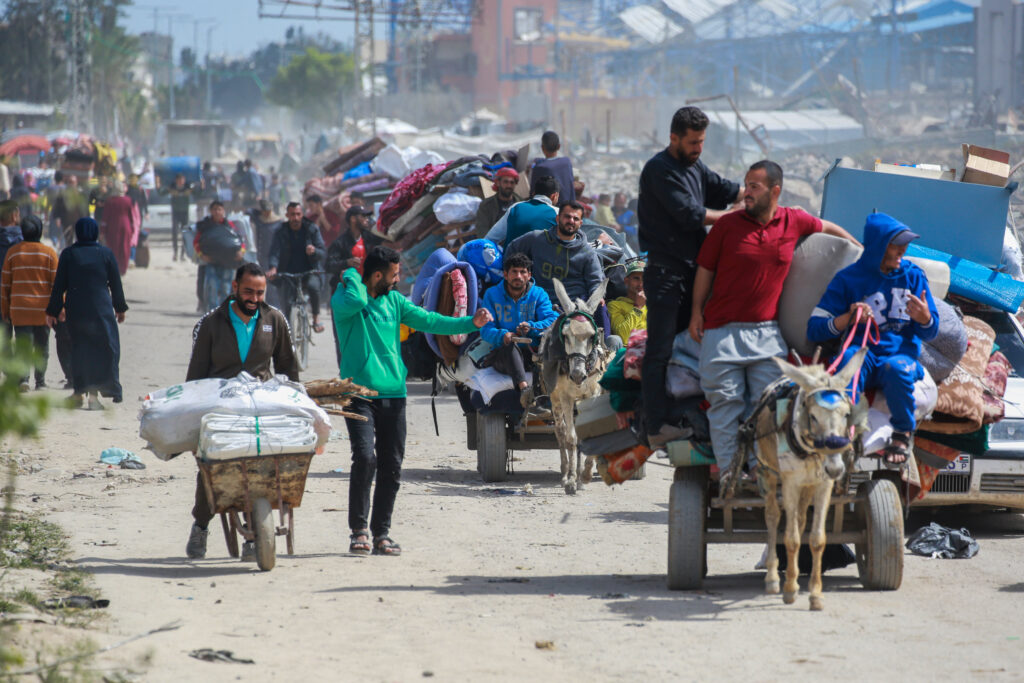AFP Asia Business
Iran frees French citizen after prison ordeal: Macron
Iranian authorities have released French citizen Olivier Grondeau, detained by the country since October 2022 on security charges, and he has returned to France, President Emmanuel Macron announced Thursday.Grondeau, 34, “is free and with his loved ones”, Macron wrote on X, adding that “our mobilisation will not weaken” to ensure the release of two other French citizens still detained by Iran in what Paris views as state hostage-taking.Macron did not give further details on the circumstances of Grondeau’s release after an almost 900-day ordeal.The other two French nationals are Cecile Kohler, a teacher, and her partner, Jacques Paris, who were detained in May 2022. They are accused of seeking to stir up labour protests, accusations their families have denied.Also writing on X, Foreign Minister Jean-Noel Barrot posted a picture of Grondeau on a plane returning home, saying: “Held hostage in Iran for 887 days, he has been reunited with his family, loved ones, and his country. It’s a huge relief.”Grondeau was arrested in Shiraz, southern Iran, in October 2022 and sentenced to five years in prison for “conspiracy against the Islamic republic”.His family rejected the charges, describing Grondeau as a passionate fan of Persian poetry who went to Iran on a tourist visa as part of a world tour.Western countries have for years accused Iran of detaining their nationals on trumped-up charges in a policy of state hostage-taking to use them as bargaining chips to extract concessions.France describes its nationals held by Iran as “state hostages” who have been arbitrarily detained and are innocent of all the charges against them.- Strength ‘running out’ -Until earlier this year, Grondeau had been identified only by his first name but his full identity was revealed by his family in January. In an audio message aired by French media at the time, Grondeau said he and the other two French detainees in Iran were “exhausted” and their strength was “running out”.Grondeau, who turns 35 next week, remains in hospital in France undergoing a battery of tests, having been severely weakened in recent months, particularly psychologically, a government source told AFP, asking not to be named.It was not immediately clear when he returned to France.There has been growing concern over the health of two other French citizens held by Iran, with Kohler’s family warning that they risked dying if they were not freed.”Cecile Kohler and Jacques Paris must be freed from Iranian prisons,” Macron said in his message Thursday.
Israel restarts ground operations, issues ‘last warning’ to Gazans
Israel bombarded Gaza and pressed its ground operations on Thursday after issuing what it called a “last warning” for Palestinians to return hostages and remove Hamas from power.The renewed offensive shattered a relative calm that had pervaded since truce took hold mid-January. Heavy air strikes began strafing Gaza early Tuesday, killing more than 400 people, according to the Hamas-run territory’s health ministry.Gaza rescuers said at least 10 more people were killed in a pre-dawn bombing near Khan Yunis Thursday.On Wednesday, the Israeli military announced it had resumed ground operations “in the central and southern Gaza Strip to expand the security perimeter and create a partial buffer between the north and south”.As Israel defied calls from foreign governments to preserve the ceasefire, Gazans were left to once again comb through rubble to find the bodies of their loved ones.”We’re digging with our bare hands,” said a man trying to dislodge a child’s body from a heap of concrete in Gaza City.After Israel urged civilians to leave areas it described as “combat zones”, families with young children filled the roads leading out of northern Gaza.Fred Oola, senior medical officer at the Red Cross field hospital in Rafah, said the renewed strikes shattered the relative calm of the past two months.”Now, we can feel the panic in the air… and we can see the pain and devastation in the faces of those we are helping,” he said.Addressing the “residents of Gaza” — governed by Hamas since 2007 — Israeli Defence Minister Israel Katz said in a video: “This is the last warning.””Take the advice of the president of the United States. Return the hostages and remove Hamas, and other options will open up for you — including the possibility of leaving for other places in the world for those who want to.”He was referring to a warning earlier this month by US President Donald Trump, who said: “To the People of Gaza: A beautiful Future awaits, but not if you hold Hostages. If you do, you are DEAD!”Of the 251 hostages seized during Hamas’s October 7, 2023 attack, 58 are still held by Gaza militants, including 34 the Israeli military says are dead.- Impasse -Hamas says it is willing to negotiate and has called on the international community to act to bring the war to an end.An official from the group rejected, however, Israeli demands to renegotiate the three-stage deal agreed with Egyptian, Qatari and US mediators.”Hamas has not closed the door on negotiations but we insist there is no need for new agreements,” Taher al-Nunu told AFP.Talks have stalled over how to proceed with the ceasefire, after the first phase expired in early March.Israel and the United States have sought to change the terms of the deal by extending phase one. Hamas wants negotiations for phase two, meant to establish a lasting ceasefire and an Israeli withdrawal from Gaza while the remaining hostages are exchanged for Palestinian prisoners.”Moving to the second phase seems to be a non-option for Israel,” said Ghassan Khatib, a political analyst and former Palestinian Authority minister.”They don’t like the second phase because it involves ending the war without necessarily achieving their objective of ending Hamas.”Israel and Washington have portrayed Hamas’s rejection of a phase one extension as a refusal to release more hostages.- ‘Shattering’ hopes -The renewed Israeli bombardment sent a stream of new casualties to the few hospitals still functioning in Gaza.A UN Office for Project Services employee was killed and at least five other people wounded when a UN building in the central city of Deir el-Balah was hit by “explosive ordnance”, the agency said.”This was not an accident,” UNOPS chief Jorge Moreira da Silva said, adding that “attacks against humanitarian premises are a breach of international law”.At least 280 UN employees have been killed since the start of the war, according to the UN chief.UK foreign minister David Lammy said on X he was “appalled” by the incident, which the NGO Mines Advisory Group said injured a British aid worker.The health ministry in the Hamas-run territory blamed Israel, which denied striking the compound and later said the circumstances were being investigated.Thousands of Israeli protesters massed in Jerusalem, accusing Israeli Prime Minister Benjamin Netanyahu of resuming strikes on Gaza without regard for the safety of the remaining hostages.”We want him to know that the most important issue is to get the hostages back,” said 67-year-old Nehama Krysler.Early Thursday, Yemen’s Iran-backed Huthi rebels — who have launched attacks claiming solidarity with the Palestinians — said they fired a missile at Israel, which the military said was intercepted.The war began with Hamas’s 2023 attack on Israel, which resulted in 1,218 deaths, mostly civilians, according to Israeli figures.The Gaza civil defence agency’s spokesman Mahmud Bassal said Wednesday that at least 470 people had been killed in the territory since Israel resumed large-scale air strikes overnight from Monday to Tuesday.The agency reported 14 members of the same family killed in an Israeli strike in the north.As of Monday, before the intense strikes resumed, the overall death toll in Gaza since the start of the war stood at more than 48,570, according to the territory’s health ministry.burs-ami/lb/sn/tym
Young Chinese women find virtual love in ‘Deepspace’
Rafayel’s girlfriends went all out to celebrate their lover’s birthday, renting malls across China for parties, decorating high-speed trains with his photos, and even staging a dazzling drone show.But the birthday boy was absent from every event — he’s a virtual character in the romantic mobile game “Love and Deepspace” that has won over millions …
Young Chinese women find virtual love in ‘Deepspace’ Read More »



